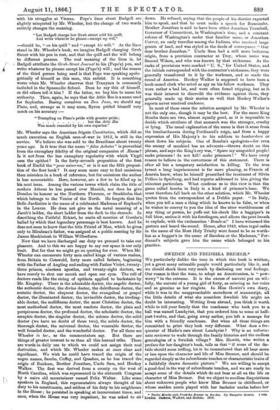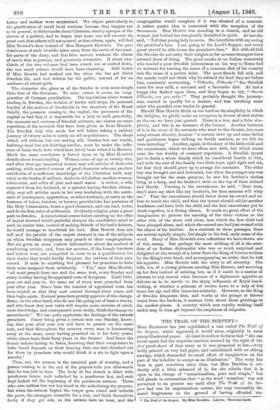SWEDEN AND FREDRIKA BREMER.*
WE particularly dislike the tone in which this book is written,. yet a great many estimable people would particularly like it, and we should shock them very much by disclosing our real feelings- Our reason is that the tone, to adopt an Americanism, is " pow- wowy " in the extreme. It is the excess of naiveté put on wil- fully, the naivete of a young girl of forty, as mincing as her voice and as genuine as her ringlets. In Miss Howitt's own diary, while it was in the unapproachable sacredness of manuscript, all the little details of what she considers Swedish life might no doubt be interesting. Writing from abroad, you think it worth while to tell your family that the coachman who took you to a ball was named Lundqvist, that you ordered him to come at half- past twelve, and that, going away earlier, you left a message for him with a friendly coachman. But when all these things are committed to print they look very different. What does a fre- quenter of Mudie's care about Lundqvist ? Why is an unfortu- nate reviewer to wade through the family histories and the endless genealogies of a Swedish village ? Mrs. Howitt, who writes a preface for her daughter's book, tells us that " if some of the de- tails should seem trifling, let it be remembered that all bear more or less upon the character and life of Miss Bremer, and should be regarded simply as the subordinate touches or characteristic traits of a faithfully drawn domestic picture." We are willing to accept a good deal in the way of subordinate touches, and we are ready to accept some of the details which do not bear at all on the life on character of Miss Bremer. But we object to needless disquisitions; about unknown people who knew Miss Bremer in childhood, or whose maiden aunts played with her bachelor uncles before her
* Twelve Menthe with Fredrika Bremer in Sweden. By Margaret Holey. 2 Td► London Jacksos, Walton', and Hodder. 1826.
father and mother were acquainted. We object particularly to the glorification of small local customs because they happen not to be general, to dithyrambs about Christian charity apropos of the sleeves of a paletot, and to hopes that some one will recover his great coat, that others will not quarrel, or that others, again, will find Miss Bremer's door instead of Miss Margaret Hewitt's. The pre- dominance of such twaddle takes away from the merit of the sensi- ble parts of the diary, and this false naivete weakens the charm of much that is genuine, and genuinely attractive. If about two- thirds of the two volumes had been struck out or melted down, the one small volume would have been charming. Still better if Miss Hewitt had worked out the ideas she has got about Swedish life, and had written for the public, instead of for an audience of school-girls.
The character she gives us of the Swedes is even more simple than that of the Germans. To some extent it seems an exag- geration of German peculiarities. The regulations about women trading in Sweden, the division of trades and shops, the personal loyalty of the natives of Stockholm to the members of the Royal family, the peasants coming to the capital, the pavement of the capital so bad that it is impossible for a lady to walk gracefully, the manners and customs of Swedish servants, are almost an exact repetition of the accounts that have been given us from Munich. The Swedish lady who made her will before taking a railway journey of twenty miles is surely an old acquaintance. The shops which sell ribbons but not sewing silk, brushes but not combs, knitting-wool but not knitting-needles, must be under the influ- ence of those trade laws which have lately been relaxed in Bavaria. Much the same conclusion is forced upon us by Miss Howitt's details about female trading. Women come of age at twenty-five, and after that age unmarried women may sell articles of their own making, while married women of good character who can produce certificates of a sufficient knowledge of the Christian faith may carry on the trades of milliner, dealer in old clothes, market-woman, tobacconist, and seller of pins and small wares. A widow, a wife separated from her husband, or a spinster having Swedish citizen- ship, may sell articles made in her own workshop with-the assist- ance of journeymen, apprentices, or other workmen, or carry on the business of baker, butcher, or brewer, provided she has partaken of the Holy Communion, bears a good character, and can read, write, and do the first rules of arithmetic. Evidently religion plays a great part in Sweden. A catechetical course before entering on the office of unjust steward would probably sharpen the candidate's mind to such an extent that, instead of making friends of his lord's debtors, he would manage to hoodwink his lord. Miss Howitt does not tell us if the parable of the unjust steward is one of the subjects on which Swedish clergymen may preach to their congregations. But she gives us some curious information about the method of conducting service, and, from her account, if the female butchers and bakers were not compelled to come in as a qualification for their trades they would hardly frequent the services of their own accord. It must be anything but pleasant for preachers to have their texts assigned them arbitrarily. " Yet," says Miss Howitt, 4' all must preach from one and the same text, every Sunday and every holiday having its appointed verse of Scripture. Until 1860, year out and yearin, the same set of texts were preached from year after year. Since then the number of appointed texts has been tripled, so that they now extend through three years, and then begin again. Earnest preachers greatly approve of this change. Some, on the other hand, who do not like going out of beaten tracks, and who know that new texts will require more exercise of mind, more knowledge, and consequently more study, think the change no amendment." We can quite appreciate the feelings of the earnests preachers. Fancy being given a certain text one Sunday, know-1 ing that year after year you will have to preach on the same text, and that throughout the country every man is hammering away at the same, some having preached on it for forty years, while others have their forty years in the future! And fancy the female bakers having to listen, knowing that their competence to bake bread depends on their hearing that one text threshed out for them by preachers who would think it a sin to light upon a novelty !
Then, too, the sermon is the essential part of worship, and a person coming in at the end of the prayers tells you afterwards that he was just in time. The body of the church is filled with ponderous boxes, each unlocked by a ponderous key, and each 'kept locked till the beginning of the ponderous sermon. Those who own neither box nor key stand in the aisle during the prayers, but when the sermon begins the verger goes round and unlocks the pews, the strangers scramble for a seat, and think themselves lucky if they get (ale, as .the sermon lasts an hour, and the congregation would complain if it was -cheated of a moment. A rather quaint idea is connected with the reception of the Sacrament. Miss Howitt was standing in a church, and an old woman just behind her was greatly disturbed in spirit. At last she said, " Tell that young lady to move. She interferes with my seeing the preacher's face. I am going to the Lord's Supper, and every guest should be able to see the preacher's face." But with all this the Swedes do not carry their religion so far as some strangers have accused them of doing. The good monks at an Italian monastery who tended a poor Swedish -journeyman on his way to 'Rome had no warrant for turning the name of a common dish of his country into the name of a patron saint. The poor Swede fell sick, and the monks could not 'think why he refused the food they set before him, constantly murmuring, "Filbunke, Filbunke !" the Swedish name for sour milk, a national and a favourite diet. At last a happy idea flashed upon them, and they began to cry, "Sancte Fitbunke, ora pro noble !" They probably thought the journey- man wanted to qualify for a master, and was invoking some saint who presided over trades in general.
Should Miss Howitt think us too hard on the simplicity in which she delights, we gladly make an exception in'favour of such stories as the one we have just quoted. There is a true and afalse sim- plicity, and this is an instance of the former. Another instance of it is the story of the servants who went to the theatre, but came away almost directly, because ".a curtain drew up and some ladies and gentlemen began talking on family matters, so we felt we were intruding." Another, again, is the story of the little child and the executioner, which we have often met with, but which seems none the less worthy of constant repetition. A Swedish tyrant put to death a whole family which he considered hostile to him, and with the rest of the family two little boys, aged eight and six, for fear they should grow up to avenge the massacre. The elder boy was brought out and beheaded, but when theyounger one was brought out for the same purpose, he saw his brother's clothes lying in a heap, and his brother's shirt on the top of them stained and bloody. Turning to the executioner, he said, "Dear man, don't stain my shirt like my brother's, for then mamma will whip me." That the executioner should throw down his sword and re- fuse to touch the child, and that the tyrant should call for another headsman and have both the child and the first executioner put to death together, is a fitting climax. It needs no great•effort of the imagination to picture the meeting of the three victims on the other side of the short cold river, into which the first child had been plunged alone, and which the second one had just crossed with the slayer of his brother. As a contrast to these passages, there are several equally simple, but simple in the bad, early sense of the word. Many of Miss Howitt's own reflections we have shown are of this stamp. But perhaps the most striking of all is the anec- dote of an Italian diplomatist who was so much surprised and delighted at the receipt of a letter from the King of Greece written by the King's own hand, and accompanying an order, that he lost his appetite Miss Howitt tells the story in all sincerliy. She tells, too, of a young princess meeting Miss Bremer, and screwing up her face instead of saluting her, as if it could be a matter of interest to any mortal what becomes of a diplomatic appetite so delicate as to be servile to the skyey influences of Royal hand- writing, or whether a princess of twelve bows to a lady of five times her age and fifty times her celebrity. However, as the. King of Sweden frequents fires, and works at the pumps or throws water from the buckets, it matters little about these greetings in the market-places. A country which sees royalty making itself useful may in time get beyond the emptiness of etiquette.































 Previous page
Previous page